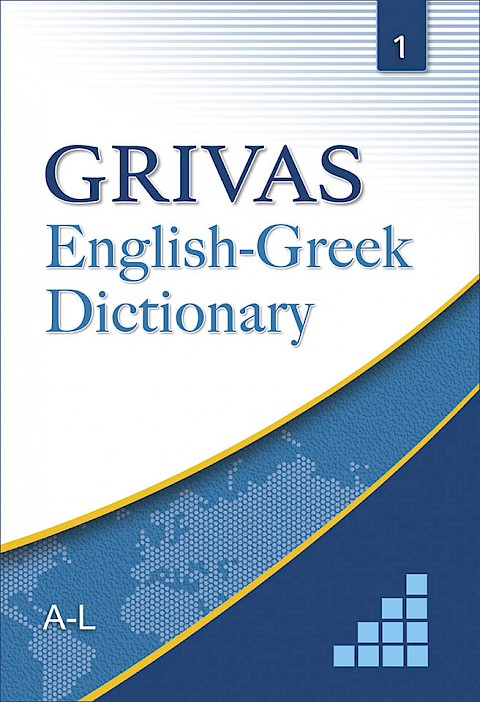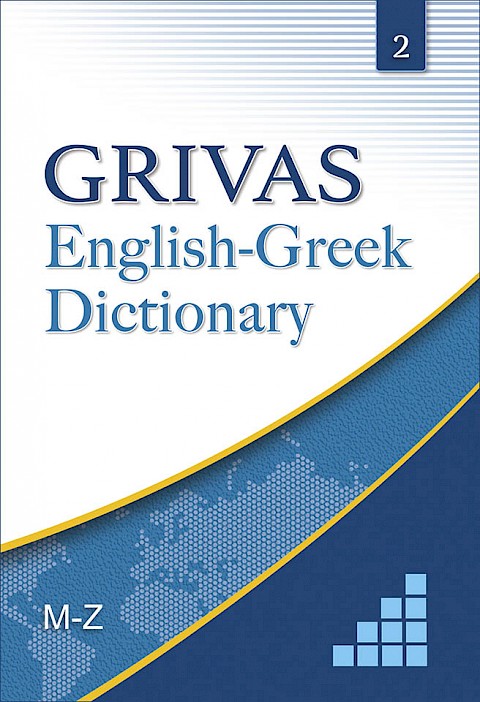GRIVAS English-Greek Dictionary (more info)
Screenshots
About the books
Grivas Publications is proud to present the two-volume Grivas English-Greek Dictionary. It is a pioneering reference source, a product of long and in-depth research in cooperation with specialist lexicographers, guaranteed for its accuracy and indispensable to all those who wish to use the English language correctly.
With more than 2,600 pages, the Grivas English-Greek Dictionary includes 60,000 main entry words and derivatives, 110,000 examples, 11,000 idioms and 3,000 phrasal verbs.
One special feature of this two-volume dictionary is that, in addition to its broad vocabulary, it includes a multitude of examples elucidating word use in English. Furthermore, English words and phrases are not simply translated; instead, language level equivalents (formal, colloquial, slang, etc.) are transferred between the two languages as precisely as possible. The Grivas English-Greek Dictionary deals with the correct usage of entry words (grammar, syntax, etc.) as well as common mistakes. It includes various expressions appropriate for everyday situations, along with proverbs, similes and sayings. In addition, it contains a plethora of specific terminology used in commerce, medicine, the sciences, economics, et cetera.
Now, let’s take a look at the structure of the Grivas English-Greek Dictionary in more detail.
FIRST PAGES
To guide the user, there is a contents page at the beginning of the dictionary, right after the introduction. Next come the phonetic symbols and abbreviations, necessary for understanding dictionary entries. After that, an analytical user’s guide to the dictionary is presented so that the reader might readily identify all information provided in each entry and put it to good use.
ENTRIES
Main entries are listed in strict alphabetical order and printed in a large blue font, while sub-entries are printed in smaller blue letters. If an entry word has more than one meaning, these are numbered and explained in detail.
If a word corresponds to different parts of speech (for example noun and verb), then there is a separate numbered entry for each.
PHRASAL VERBS
Phrasal verbs are listed separately, in alphabetical order, beneath the entry of the main verb, in a smaller blue font.
PRONUNCIATION
Entry word pronunciation follows the International Phonetic Alphabet, which provides the most accurate phonetic transcription of the word. The innovative approach of this dictionary is that it doesn’t present just the British English pronunciation, as is usually the case with English-Greek dictionaries; instead, it also provides the American English pronunciation (with any of its variations), as well as any existing alternate pronunciations (such as local varieties).
PART OF SPEECH
After the entry word and pronunciation, the dictionary provides the part of speech, abbreviated and italicised. If the entry has multiple definitions which are grammatically varied, these variations are noted right after the corresponding numbering.
PLURAL FORM OF NOUNS
Many nouns have an irregular plural, while in the case of compound nouns the plural form is not always evident. Furthermore, some words have two alternative plurals. In these cases, the form is given in square brackets [ ].
COMPARATIVES
Adjective and adverb comparatives are also given in brackets, whether their formation is regular or irregular. If no comparatives are provided, this means that these are formed with ‘more’ and ‘most’ or that they do not exist.
ENGLISH LANGUAGE VARIATIONS
Variations of the English language (as in British, US and Australian) are indicated in abbreviated, small-capital form. If there is no such note, it means that the word, phrase, spelling, etc. is commonly accepted.
SEMANTIC NUANCES – CLARIFICATION THROUGH EXAMPLES
One of the most important problems a user faces with most English-Greek dictionaries is the difficulty to differentiate among the semantic nuances of a word and its correct usage. A dictionary should be user-friendly and analytical, providing readers with all the information necessary for them to correctly distinguish among definitions, choose the most appropriate one, according to text type and register of the situation, and use it correctly both semantically and syntactically. The Grivas English-Greek Dictionary covers a broad range of possible interpretations of English words, phrases, et cetera, in Greek, using enough examples to clarify as many interpretational nuances as possible.
WORD TYPE AND REGISTER
Another reason why English words or phrases can be used incorrectly is the lack of understanding of when and how they are used. As a result, a non-native speaker can be under the mistaken impression that, for example, a word can be used in everyday life, whereas it is in fact a scientific term. Therefore, it is more than necessary to indicate the word type (medical, financial, and so forth) and register (formal, colloquial, et cetera).
OTHER GRAMMATICAL AND SYNTACTICAL INFORMATION
Entries also give additional grammatical and syntactical information, printed in bold black type. This way readers can easily see which prepositions, adverbs, et cetera, usually accompany the verb, identify common collocations, and so forth.
IDIOMS
After the main definitions of each entry, the dictionary lists (where appropriate) the more – and less – common idioms containing the entry word. These idioms can be found at the end of the entry, printed in blue letters and in alphabetical order for easy reference, and are translated into Greek as closely as possible.
REFERENCES
For any idioms or phrases explained in other entries, as well as for entries with similar definitions or to compare with confusable words, see the references at the end of the entry. If there is a word in parentheses after the reference, it means that the idiom/phrase can be found under that word.
SYNONYMS AND ANTONYMS – SIMILAR PHRASES
Synonyms and antonyms are listed alphabetically at the end of selected entries; finally, when deemed useful, similar phrases helping to enrich user vocabulary are supplied under the entry.
So this is the two-volume Grivas English-Greek Dictionary, an invaluable aid for all learners of English, be they student or professional.







